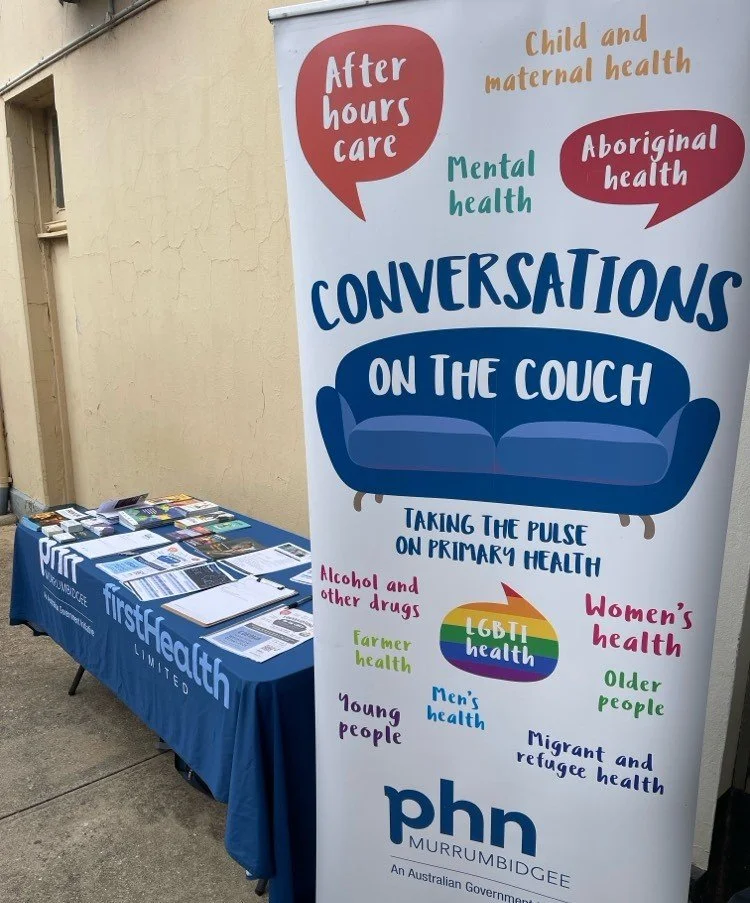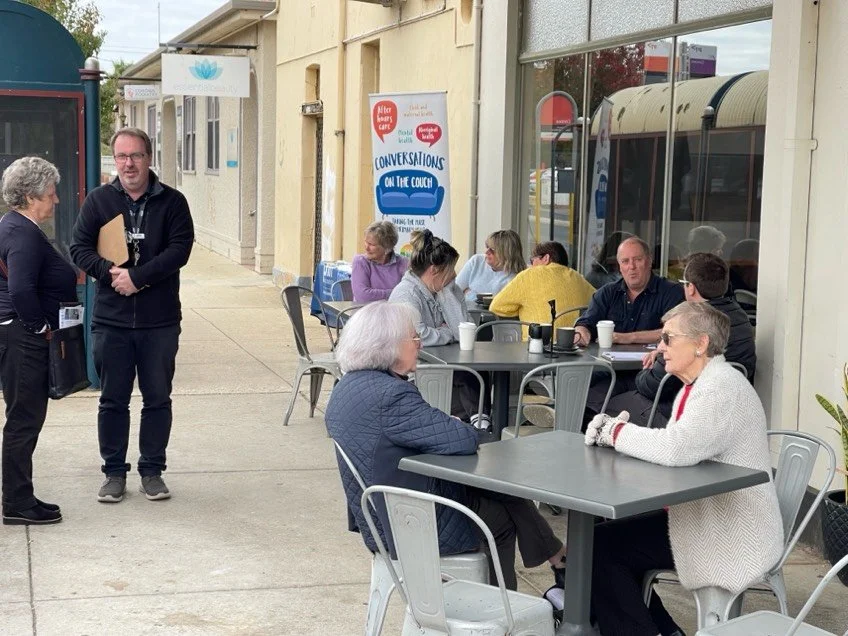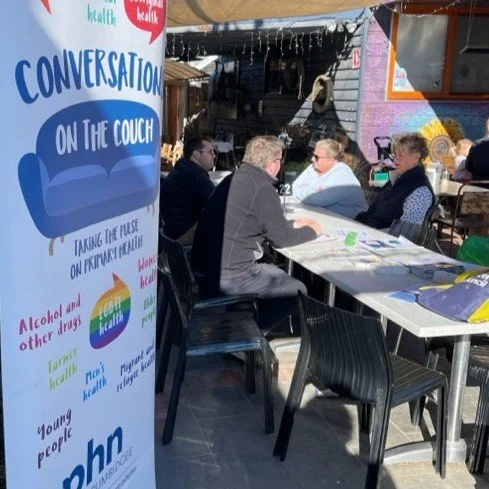Conversations on the Couch: community voices shape future health priorities across Murrumbidgee
Murrumbidgee Primary Health Network (MPHN) has completed its 2025 Conversations on the Couch series, engaging more than 130 residents across 15 towns to better understand local health needs and lived experiences. The initiative included visits to Howlong, Corowa, Barham, Culcairn, Jindera, Hanwood, Hillston, Harden, Boorowa, Cootamundra, Junee, Wagga Wagga, Batlow, Tumbarumba and Holbrook. A dedicated First Nations series, Yarns on the Couch, was held in Hay, Gundagai, and Wagga Wagga.
The Conversations on the Couch series revealed consistent themes across the region. Many participants described long wait times to see a GP, limited access to mental health and allied health services, and the high cost of care. While residents of some towns reporting having good access to local health providers, others relied on visiting services that were irregular and often booked out. Residents also spoke of the challenges of travelling for specialist appointments, especially in towns with little or no public transport.
Mental health was a key concern, with many describing a lack of services for youth, men and older adults. Some shared that telehealth felt impersonal, while others valued the convenience. The cost of assessments and therapy was a barrier for many, particularly for conditions like autism and ADHD.
Older residents raised concerns about aged care availability, long wait times for home care packages, and the impact of living alone. Social isolation, especially among older adults and marginalised groups, was a recurring theme. Cost-of-living pressures were also evident, with stories of families skipping meals, relying on charity services, and struggling to afford heating and rent.
Despite these challenges, many communities showed resilience and connection. Local spaces such as libraries, Men’s Sheds and cafes were praised for providing social support, though younger and LGBTQIA+ residents often lacked safe and inclusive places.
MPHN’s Acting Chief Data Officer Dr Ryan Du Toit said Conversations on the Couch provided valuable insights into the lived experiences of rural and regional communities.
“People were generous with their stories and open about what they felt was working and what needs improvement,” Dr Du Toit said.
“We heard about the importance of local GPs, the challenges of accessing mental health care, and how cost-of-living pressures are affecting people’s ability to stay well.
“Many spoke about the need for better transport options, more affordable services, and greater support for vulnerable groups. These conversations help us understand what matters most and where we need to focus our efforts.”
Town-by-town snapshot
Data for Conversations on the Couch were collected in person, capturing the unique experiences, perceptions, and understandings of community members. These personal accounts provide varied perspectives rather than a single, universal truth. The insights shared in this report reflect the rich diversity of healthcare experiences across the region.
-
Barham residents reported a loss of hospital services over time and long waits for GP appointments. Specialist and maternity care required travel, often to Bendigo or Echuca. Mental health support was limited, and youth engagement was low. Despite these challenges, the town had strong community spirit and valued social spaces like the library and local cafe.
-
Batlow residents called for mobile clinics to provide services like skin checks. Public transport was limited, and existing services were stretched. Social isolation was common, especially among older adults. The Men’s Shed was praised for its supportive environment.
-
In Boorowa, GP services were considered generally good, though a recent closure left some without access to their health records. There was limited awareness of visiting allied health professionals, and some apathy around available services. Community transport was available but underused, with residents encouraged to sign up for aged care support.
-
Cootamundra residents noted delays in accessing GPs and a lack of community transport. However, local pharmacists were highly regarded for their proactive and informative support. Community spaces like ‘Vinnies’ and the library were busy and valued by people of all ages.
-
Residents in Corowa expressed frustration with the lack of continuity in GP services, describing it as a “revolving door.” Mental health care was seen as unaffordable, with significant out-of-pocket costs for travel and specialist appointments. The absence of social spaces for LGBTQIA+ people was also noted, contributing to feelings of isolation.
-
Loneliness and a lack of connection were key issues in Culcairn. While telehealth was available, some preferred in-person appointments for the therapeutic value of face-to-face interaction. There was also confusion about where and how to access local health services.
-
Most residents were satisfied with GP access, but specialist care often required travel to Wagga. Mental health was a major concern, with limited affordable options. Mothers’ groups and local GPs were valued, while older adults reported challenges with aged care and social isolation.
-
Transport was considered a major issue in Harden, with residents travelling for groceries and specialist care. The cost of living was a widespread concern, with more people shopping at op-shops. Specialist care was described as expensive, especially when factoring in travel costs.
-
Residents described difficulty accessing maternity and paediatric care, with travel required to Griffith or Wagga. Mental health support was limited to telehealth, and transport costs deterred appointments. Aged care had long waitlists, and social spaces were lacking, though the Men’s Shed was a valued outlet.
-
GP access was seen as a challenge, with some residents reporting difficulty securing appointments. Residents spoke of preferring to travel to Wagga for care rather than Albury. Coordination between NSW and VIC health systems was seen as problematic.
-
Howlong residents raised concerns about the decline of small towns and the lack of political attention. Farmers were seen as needing more support. Domestic violence, problematic substance use, and gambling were identified as growing issues. Cost-of-living pressures were acute, with some residents skipping showers or meals to save money.
-
Most residents travel to Albury/Wodonga for specialist and maternity care. While the town has a strong sense of community, mental health support is limited, and privacy concerns deter access. Locals expressed interest in more mobile clinics offering services like breast screening, blood donations and skin checks.
-
Junee was described as having strong community spirit and responsive healthcare. Residents praised their GP and noted that locals often drive each other to Wagga for specialist appointments. The town was seen as fortunate in terms of health service access. n
-
Mental health services in Tumbarumba were reported to have declined, requiring travel to access care. GP services were generally accessible, but allied health professionals were limited, with long waitlists and low awareness of visiting providers.
-
Wagga Wagga residents highlighted long wait times for geriatric care and a shortage of psychologists. Ten funded mental health sessions were seen as insufficient for long-term issues. There were calls for safer spaces for LGBTQIA+ people and criticism of heterosexism in the medical field. Participants spoke of relying on pharmacies or online searches instead of visiting a GP.
MPHN is using this community feedback to guide future improvements and has incorporated findings into the Health Needs Assessment refresh. To continue shaping healthcare across the region, Murrumbidgee residents are encouraged to share their thoughts in MPHN’s quick, anonymous Health Needs Assessment survey at mphn.org.au/hna or by contacting MPHN on (02) 6923 3100.





